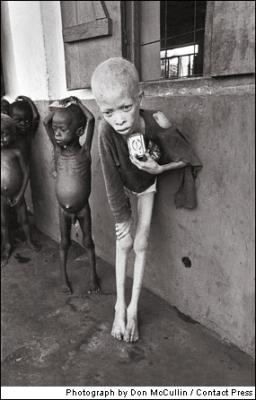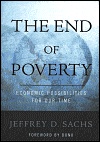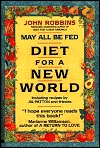
Back to Americans For Morality Home Page
The Poor
 One of the biggest moral issues in the world today is our responsibility to the poor. Leaders and those who speak for the Republican agendas do not like to discuss the poor except in disparaging terms. In Rush Limbaugh's best selling book, he discussed the poor like this:
One of the biggest moral issues in the world today is our responsibility to the poor. Leaders and those who speak for the Republican agendas do not like to discuss the poor except in disparaging terms. In Rush Limbaugh's best selling book, he discussed the poor like this:
"There will always be poor people. The poor in this country are the biggest piglets at the mother pig and her nipples. The poor feed off the largesse of this government and they give nothing back. Nothing. They're the ones who get all the benefits in this country. They're the ones who are always pandered to... And do the poor pay anything back? Do they pay any taxes? No. They don't pay a thing. They contribute nothing to this country. They do nothing but take from it. There are people who are putting into this economy. There are people who are working hard every day, playing by the rules and contributing. They are the givers. Who are the takers? The poor. (p40 The Way Things Ought to Be)
Democrats on the other hand have a reputation for not only feeling responsible for the poor of this country, but also for the poor of the world.
The Poor at Home
Many have complained for years that there needs to be welfare reform, but little has been proposed by the right to resolve any of the ills of the welfare system. Why? Because many on the right share a belief that the poor have brought about their own misery and are not deserving of help. Others simply want to abolish welfare rather than reform it.
There are many criticisms of American welfare. Many opposed to it believe that if we support those in need, we send a message to those who don't yet have that need to be lazy. In other words, if we create a "net" for someone to fall back on, we will tempt others to use that net. On the one hand, we are dealing with someone who has already gotten into trouble, and on the other, we are sending a message to those not yet in trouble that if they choose not to work, then we will be there for them.
Republicans have often championed the ideas of self-sufficiency, and many of them feel that the "net" is bad for teaching principals of self-reliance. Many call for its removal. The right is known for often promoting the idea to "teach a man to fish" rather than simply "giving him the fish." This is certainly a noble sentiment.
Democrats, on the other hand, have long felt that a moral nation is responsible for its poor, destitute, sick, and infirmed. They believe that the "fish" argument has been used to "take the fish away first" before even discussing anything regarding self-sufficiency. Democrats believe that we are all "beggars" on some level and all need one another in this world. We must see our neighbor as ourselves. Because we have been greatly blessed as a nation, we in turn have a responsibility to help those who have less.
In a nutshell, a Democrat would risk encouraging someone to be lazy rather than let one child go hungry. There are certainly flaws to the welfare program, but the first person in decades to try to do something about it was a Democrat. President Bill Clinton signed welfare reform into law in 1996. Under the reform, more power was given to the states and in addition, now:
1. Requires most recipients to work within two years of receiving assistance,
2. Limits most assistance to five years total, and
3. Allows states establish "family caps" to deny additional benefits to mothers for children born while the mothers are already on public assistance.
And this was only part of the reform. Work programs were created to get people out of the system and focus on the truly needy. The official details of this Welfare Reauthorization can be read in the addendum below from the U.S. Senate's Democrat website (http://democrats.senate.gov) Senator Harry Reid, Democratic Leader.
Unfortunately, as the arguments were being taken away from those who opposed helping the poor, many from the right continued to cry foul and began preaching an anti-entitlement doctrine. They openly claimed that people are not "entitled" to food, health and other basic necessities. Many in the Republican party believe that health care needs to be completely privatized. As a result, those with more money have access to better doctors, treatment, and drugs. However, this implies that the wealthy have a right to better health care than the poor. The rationale behind this is that the wealthy are wealthy because they "bring more to the marketplace." As a result, they argue that they are more valuable to our society, and thus deserve greater access to public services. And thus the ugly head of capitalism was reared. Although aspects of capitalism have the merit of periodically bringing improvements to society as a whole through competition, it can also leave the individual by the wayside.
Wealth and poverty in the United States are not generally nor simply a result of someone's ingenuity or hard work. Sometimes it simply means being in the right place at the right time. As wealth increases, so does power. The power is felt during elections as people buy their way into more power. It is felt in advertising and the manipulation of the uneducated. To those who have money is given not only the power to make more money, but also the power to keep the poor in destitute situations. For example, by keeping the minimum wage down while the cost of living increases, the wealthy can hire more people. This creates a greater disparity between the rich and poor. Under the tax cuts in the year 2000, for every dollar in reductions for a middle-class family, the top 1 percent of households will receive $54, and those with $1 million or more in income will benefit by $191! From 2000-2003 the number of American living in poverty increased by 3.5 million people, while the income for the 400 wealthiest Americans jumped by 10 percent in the year 2002. The salaries of corporate chief executives jumped from 40 times to four hundred times the average workers pay.
 World wide, the disparity between the two is exponential. In 1900, the ten richest countries were nine times wealthier than the ten poorest ones. In 1960 the ratio was 30:1 and in 2000, the average income per person in the twenty richest nations was $27,591 and in the poorest, only $211, a ratio of 131:1!
World wide, the disparity between the two is exponential. In 1900, the ten richest countries were nine times wealthier than the ten poorest ones. In 1960 the ratio was 30:1 and in 2000, the average income per person in the twenty richest nations was $27,591 and in the poorest, only $211, a ratio of 131:1!
Here is the real world situation. Half the world, almost three billion, live on less than $2 a day and half of that group on less than $1 a day. People are starving throughout the world. Not because there isn't enough food, but rather because of problems with distribution and problems of American interference. For example, every pound of ground beef requires about 16 pounds of grain to feed the cows. It only takes one pound of grain to produce one pound of bread. So, 16 pounds of bread are sacrificed so we can go to McDonalds to have our burgers. In fact, 150 acres of rain forest a minute are being cut down in part to make room for the grazing of cattle by fast food giants like this. Is your whopper really worth it? If Americans reduced their meat consumption by only 10%, it would free up land and resources to grow 12 million tons of grain annually, more than enough to feed the over 60 million people who will starve to death on the planet this year (see footnote 1 at bottom).
 In 1965, livestock consumed only 6 percent of Mexico's grain. Today the figure is over 50 percent. (footnote 2) In Guatemala, much of the land and other resources for food production is given over to producing meat, while 75 percent of the children under five years of age are undernourished. The meat produced doesn't go to those in need. It goes to those who can afford it. Every year Guatemala exports forty million pounds of meat to the United States. (footnote 3)
In 1965, livestock consumed only 6 percent of Mexico's grain. Today the figure is over 50 percent. (footnote 2) In Guatemala, much of the land and other resources for food production is given over to producing meat, while 75 percent of the children under five years of age are undernourished. The meat produced doesn't go to those in need. It goes to those who can afford it. Every year Guatemala exports forty million pounds of meat to the United States. (footnote 3)
Another example of American interference is the country of Mali. Three-fourths of Malians live on less than $1 a day, and 90 percent on less than $2. One quarter of its 12 million people depend directly on cotton for their livelihoods, and those families lucky enough to have the national average of five acres earn $280 a year. The chief obstacle to improving their lives is our country's cotton subsidies, which in some years drive down the world price to below the cost of Malian production. To put this into perspective, U.S. subsidy payments just to our cotton farmers are greater than the total national income of Mali, and double that amount of all American development assistance to sub-Saharan Africa. (footnote 4)
We need to ask how we can end poverty in the United States and abroad. Questioning the motives of the poor certainly appeals to those who do not feel a responsibility toward them and helps them to justify personal selfishness. Democrats believe we are not separate from the world but rather part of the world. People and all life are connected. We are our brother's keeper.
Back to Americans For Morality Home Page
Links and Suggested Reading
 The End of Poverty: Economic Possibilities for Our Time by Jeffrey Sachs
The End of Poverty: Economic Possibilities for Our Time by Jeffrey Sachs
 May All be Fed by John Robbins
May All be Fed by John Robbins
 Diet for a Small Planet by Frances Moore Lappι
Diet for a Small Planet by Frances Moore Lappι
Addendum 1Return to reading
From the U.S. Senate's Democrat website (http://democrats.senate.gov) Senator Harry Reid, Domocratic Leader
Welfare Reauthorization
The Personal Responsibility and Work Opportunity Reconciliation Act (PRWORA), enacted in 1996, made dramatic changes in federal programs to aid children and families in poverty, a large proportion of whom are minorities. While the process leading to enactment was complicated and controversial, Senate Democrats agree that welfare reform has had a profound impact on disadvantaged families.
Democrats are encouraged to see that some families are making the transition from welfare to work, but know it will be critical to maintain strong federal and state support for welfare reform, especially under the current economic circumstances, if we are to build on the successes, and address the challenges facing our welfare system.
Senate Democrats have proposed that several overarching principles be considered as Congress begins discussions about reauthorizing the Temporary Assistance for Needy Families (TANF) program. These include:
Reducing poverty, particularly among low-income working families. While poverty has declined since 1996, it has not decreased as much as it should have given the increase in work effort by low-income families. Our current economic situation is likely to have a disproportionate impact on low-income families. __To be successful, a work-oriented welfare program must demonstrate to participating families that work will be rewarded, and they will ultimately be better off if they play by the rules. Families also need to know that child care, food, health care, transportation, and shelter will be affordable and available as they do their part to attain self-sufficiency.
Staying engaged with the most troubled families. Research suggests that some families on assistance face substantial barriers to going to work, such as domestic violence and mental health issues. Senate Democrats are committed to making sure our welfare system helps these families and their children, and does not abandon them.
Strengthening all families. Federal programs should encourage innovative strategies to keep healthy families intact and promote healthy, more stable families. We should remove "marriage disincentives" from public assistance programs such as the marriage penalty in the Earned Income Tax Credit (EITC), encourage fathers to stay connected with their children, and pay particular attention to families with special challenges, such as legal immigrants, including those whose children are American citizens, families with limited English skills, Native Americans, and families living in rural areas. __We should also review the evidence from studies, such as the Minnesota Family Investment Program, which suggests that income supports to low-income families may improve family stability.
Maintaining a strong federal-state partnership. States need to know that the federal government will keep its promises and be a strong, reliable partner in the effort to encourage work. For their part, states should be accountable for effective implementation of programs to help families make the transition from welfare to work.
Senate Democrats have introduced proposals to address these critical issues and agree that a number of provisions should be part of any legislation to reauthorize the TANF program. These include:
At a minimum, maintaining full federal funding levels and maintenance-of-effort requirements so that states have the resources to provide families with supports they need to move from welfare to work and ultimately achieve self-sufficiency;_
Strengthening incentives for states to focus on reducing poverty, as well as encouraging work, by creating a poverty reduction bonus; _
Restoring resources for the Social Services Block Grant so states can provide other services to disadvantaged families; _
Making sure an effective TANF contingency fund is in place, and supplemental grants are available, so policies can be maintained during economically challenging times;_
Increasing federal income supports by strengthening the EITC;_
Providing increases in federal support to meet increasing demands for quality, affordable child care;_
Increasing incentives for non-custodial fathers to stay involved in their children's lives; and_
Improving distribution rules for child support payments to ensure children benefit when non-custodial parents meet their obligations._
Senate Democrats feel strongly that an important test of a civil society is how it helps its disadvantaged children, families, and minority communities. Senate Democrats look forward to working with Republicans in a collaborative way to continue to enhance federal welfare policies so they help families escape poverty and achieve self-sufficiency.
Return to reading
1. Resenburger, B.. "Curb on US Waste Urged to Help World's Hungry," New York Times, October 25, 1974
2. Barkin, David and DeWlat, Bill, "The Mexican Food Crisis" and "Taking Stock:Animal Farming and the Envoronment" by the Worldwatch Institute.
3. Acres, USA, Kansas City, MO, Vol. 15, No. 6, June 1985, p.2.
4. as reported by President Jimmy Carter, in "Our Endangered Values," Simon and Schuster, 2005
Back to Americans For Morality Home Page

 One of the biggest moral issues in the world today is our responsibility to the poor. Leaders and those who speak for the Republican agendas do not like to discuss the poor except in disparaging terms. In Rush Limbaugh's best selling book, he discussed the poor like this:
One of the biggest moral issues in the world today is our responsibility to the poor. Leaders and those who speak for the Republican agendas do not like to discuss the poor except in disparaging terms. In Rush Limbaugh's best selling book, he discussed the poor like this: World wide, the disparity between the two is exponential. In 1900, the ten richest countries were nine times wealthier than the ten poorest ones. In 1960 the ratio was 30:1 and in 2000, the average income per person in the twenty richest nations was $27,591 and in the poorest, only $211, a ratio of 131:1!
World wide, the disparity between the two is exponential. In 1900, the ten richest countries were nine times wealthier than the ten poorest ones. In 1960 the ratio was 30:1 and in 2000, the average income per person in the twenty richest nations was $27,591 and in the poorest, only $211, a ratio of 131:1! In 1965, livestock consumed only 6 percent of Mexico's grain. Today the figure is over 50 percent. (footnote 2) In Guatemala, much of the land and other resources for food production is given over to producing meat, while 75 percent of the children under five years of age are undernourished. The meat produced doesn't go to those in need. It goes to those who can afford it. Every year Guatemala exports forty million pounds of meat to the United States. (footnote 3)
In 1965, livestock consumed only 6 percent of Mexico's grain. Today the figure is over 50 percent. (footnote 2) In Guatemala, much of the land and other resources for food production is given over to producing meat, while 75 percent of the children under five years of age are undernourished. The meat produced doesn't go to those in need. It goes to those who can afford it. Every year Guatemala exports forty million pounds of meat to the United States. (footnote 3) The End of Poverty: Economic Possibilities for Our Time by Jeffrey Sachs
The End of Poverty: Economic Possibilities for Our Time by Jeffrey Sachs May All be Fed by John Robbins
May All be Fed by John Robbins Diet for a Small Planet by Frances Moore Lappι
Diet for a Small Planet by Frances Moore Lappι